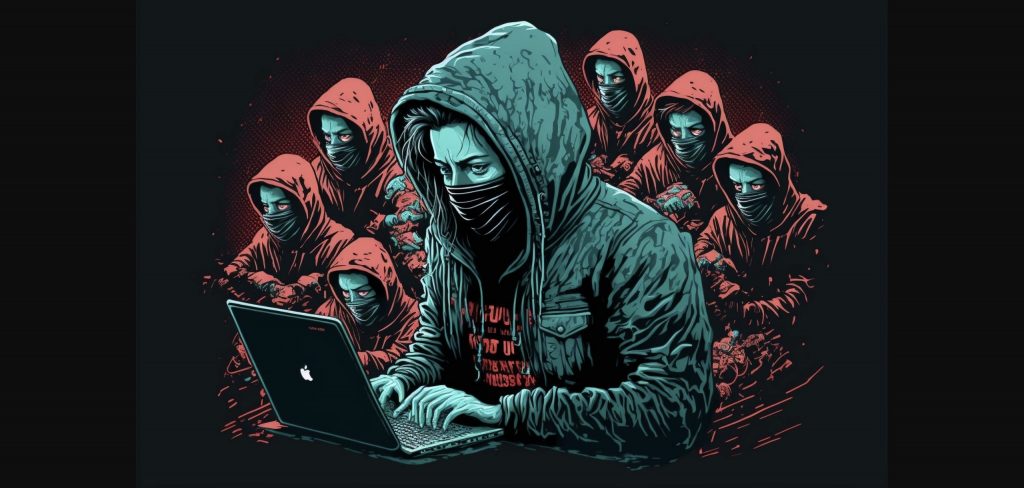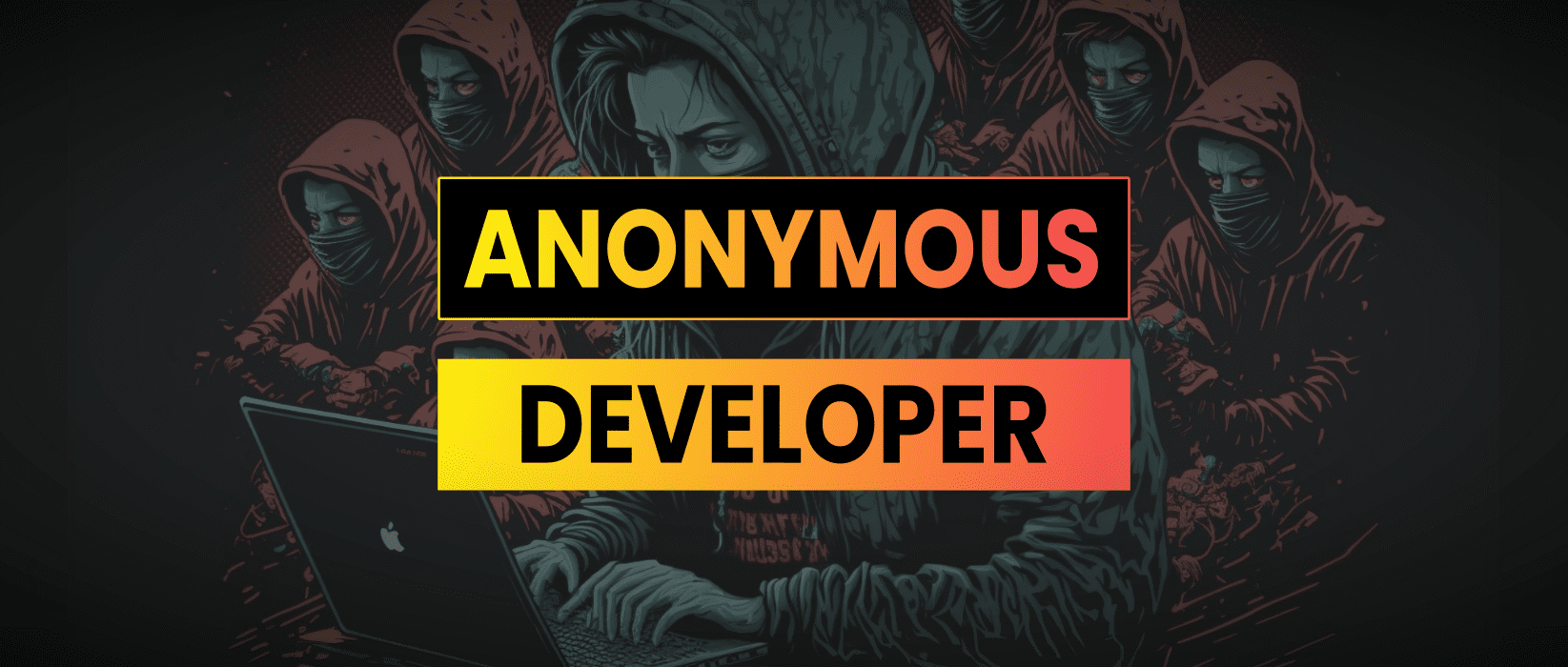There are plenty of articles and content about why you should be an anonymous developer for blockchain projects but I haven’t seen much content about best practices and how to actually set up an anonymous development environment.
In this article we will cover the following:-
- Anonymous Developer Video Tutorial
- Benefits of Anonymous Development
- Difficulties Staying Anonymous
- Setting Up an Anon Dev Environment
- Setting Up A Web3 Project Anonymously
- Best Practices for Anonymous Development
- Why You Should Set Up Anon Accounts Today
Anonymous Developer Video Tutorial

Benefits of Anonymous Development
Let’s first look at some of the benefits we want to realise when developing anonymously:-

Increased privacy for you and your family
If you are in your teens then it’s probably not the biggest factor as you have less to lose but if you have a family that it is your responsibility to protect then there are benefits to increasing privacy. If you are a signature on a multi-sig that holds billions of dollars you might not want that published alongside your name and address for anyone to find online.
Ability to experiment without fear of public opinion
Setting up an anonymous pseudonym can reduce the pressure you put on yourself to create “the next big thing”. You might enjoy working on a public goods project or something that isn’t commercially viable which is easier to justify when your name and reputation aren’t directly attached to it from a psychological point of view.
Reduced risk of legal and regulatory issues
This is something we will revisit later but there have been cases of developers and founders in the space getting subpoenaed and even arrested and tied up in legal battles. Regulation isn’t necessarily a bad thing but in DeFi it never feels like regulators have your best interests aligned with theirs.
There’s an ongoing case (Ooki DAO) currently where a California federal judge is pressing charges against developers stating that the DAO structure does not offset their personal responsibilities.
Quality of the product becomes more important than team
Many VC’s will tell you they invest in the person rather than the product. This is great when you are a rock star who just quit their lead dev job at a FANG company. But for the rest of us mere mortals there’s some benefit to taking attention away from the who and focusing on the what, how and why.
Separation of work and life, ability to log off
One of the biggest benefits I’ve found from anonymous development is it gives you the ability to switch off, log out and enjoy some reality once in a while. When you have your personal profile attached to a project you will get hounded night and day by “wen moon ser?” “CEX listing co-ordinators” and “NFT partnership opportunities”. Being able to separate your personal life and social media from the craziness of being a blockchain dev is valuable.
Difficulties Staying Anonymous
There are difficulties in developing anonymously that you should think about before you set up your own system. Do you want to be more anon than Satoshi or is anonymous~ish OK where you use a pseudonym but know your colleagues in person?

Lack of trust and credibility
Users, investors, potential partners will have zero trust in a newly set up anonymous pseudonym. Everyone in crypto is cynical and for good reason. If you are going to develop anonymously you need to build trust through products and delivering on your roadmap effectively.
Comradery & Networking
I work remotely from a home office the vast majority of the time which can be isolating, especially after a long lockdown during the covid period. Developing anonymously doesn’t do your social life any favours. For this reason I prefer to know the people I work with on a personal level and value those relationships. Obviously this will depend on who you are working with and their privacy requirements but I’ve found having a public facing pseudonym but then being able to do a zoom call with the cameras on is a good balance for me personally.
Getting Doxed
One major risk for anon developers is being doxed (where your personal details are published publicly). This can happen either maliciously or just a slip up.
- Code snippets, can you write something without using any code you’ve previously used before? I could probably be doxed by the smart contract which has 99% of the code directly copied and pasted from StackOverflow.
- Disgruntled colleague, if you let your guard down with the people you directly work with there is always the risk you do something to upset them and they can either dox you or use the threat of doxing for leverage.
- Language, and communication patterns, many years ago I ran a language analysis script to try and find out who Satoshi Nakamoto was. If you create content anonymously, every piece puts out a little clue which could lead back to your blog… for example 🙄
- Mixing up profiles and dumb stuff, it’s not unusual for devs to dox themselves by posting a tweet from the wrong browser. Creating a commit with a personally identifiable wallet address etc.
Setting Up an Anon Dev Environment
To create an anonymous developer account we need an anon Github account. The first step in setting this up is to create an anonymous email account. There are a few options here:-
Protonmail – this is a privacy focused email provider, it’s free, easy to setup and reliable. It is also well setup to manage multiple accounts if you have multiple anon pseudonyms.
Gmail – Less privacy focused but useful because it provides the option to “Sign up with Google” when setting up other accounts.
One thing I like to do is use a separate browser for everything I do anonymously. So if you use Chrome for day to day browsing you could maybe setup all your anon accounts using Firefox or Brave or one of the countless other Chromium browsers.
This keeps all your bookmarks, logins and browsing history separate.
The next step is to set up a new Github profile: https://github.com/signup
Once you’ve set up your Github profile you can create a repository or fork something from the web interface. You can edit files and and files directly from within a web browser or setup credentials for the command line as you see fit.
Another thing you will want is a separate digital wallet for web3 work. I use metamask and you can import a seed phrase or private key into metamask and label the account as the anon user. This metamask wallet will only be available in the web browser that you use for anonymous development.
Funding the wallet is more tricky. Blockchains are open and transparent in nature so if you need to send funds from your personal account to your anon account you’ll leave a traceable on-chain transaction. A few options to get around this:
- Use a testnet faucet for testnet funds initially
- Buy mainnet native tokens from an onramp service
- Transfer funds from a centralized exchange
- Use a P2P broker to purchase funds via bank transfer
- Acquire funds from a VC or angel investor
- Use a mixer service like Tornado Cash (check legality in your jurisdiction)
The final thing to bare in mind is that you need to avoid duplicating code from your previous work. You might have already written a function to do something in Solidity but if it’s published on your personal Github it would be silly to copy it directly into a anonymous repository.
Setting Up A Web3 Project Anonymously
Once you have a separate browser, email account and Github account you can set up the rest of your socials for a new project.
I’d recommend setting these up as project specific accounts rather than accounts for your individual pseudonym alter-ego i.e. @WhateverFinance
Here is a non-definitive list of the accounts you may want to create.
- Twitter – Crypto twitter is one of the most active social networks for the blockchain sector
- Discord – Discord can take a lot of time to manage and you’ll get as many people offering to manage the community (CM’s & mods) as you’ll get really engaged community members.
- Telegram – Very useful for business development and outreach as well as coordinating with internal team members. Telegram requires a sim card to set up an account.
- Medium – I hate it but it’s widely used as a blogging platform for crypto projects
- Substack – Very similar to Medium but more focused on building a mailing list and newsletter which provides long term benefits to a project
- Gitbook – Used widely for documentation, whitepapers and tokenomics
- Slack/Trello/Asana – Whatever project management tool you want to use. This is very useful for larger teams to coordinate and create systems for things like content creation and marketing initiatives. Note that these are generally freemimum products.
- Zoom – most widely used video conferencing application. You can keep your camera off and setup a profile avatar.
- Site Hosting – hard to do well anonymously but you can potentially host on a free provider such as netlify or directly via github pages. This doesn’t scale well so you may want to set up a cache solution like Cloudflare.
- Domain name – It’s possible to set up a completely anonymous domain registration “corporation” and then use providers private registration options on top of this. Privacy options vary across TLD’s with some requiring KYC verification so stick to .com or .io
For some of these (primarily Telegram) you may need a phone number to verify your account. In the UK you can get pre-activated sim cards from ebay which last about 6 months before they get deactivated if you don’t use them.
If you want premium accounts you will need a credit card to upgrade. There’s no good way to do this legally and anonymously so perhaps a prepaid card with virtual cards is a good option. Something like Revolut offers this.
Best Practices for Anonymous Development
- Use anonymous accounts from within a separate browser and don’t log into anon accounts from your main browser or mobile device. This is where mistakes can happen.
- Use a separate anon account for each project and don’t try to promote an individual anonymous pseudonym in to a crypto twitter personality. While there are benefits to this such as reputation building it greatly diminishes the chances of your anonymous profile holding up to any kind of investigation if you have years of social network interactions.
- Many messaging apps offer encryption with Signal and Telegram both being viable options. Telegram is widely used in Web3, especially in Europe.
- If you are concerned about location information being spread to service provides you can use an anonymous virtual private network (VPN) to conceal your IP address and location. It’s been noted that the RPC nodes you connect to via metamask record your IP address and link it to a wallet address.
- Decide early on how dedicated you are to staying completely anonymous. Do you want to protect your identity from the degen “wen Lambo” guys or does your profile need to be hidden from the US government and their 3 letter agencies?
- Try to keep everything you do within the anonymous project contained into it’s own ecosystem. Treat it as a separate job that you can log into and out of and try not to work on your anon project at the same time as other work.
Why You Should Set Up Anon Accounts Today
If you are still sitting on the fence about whether or not to develop anonymously let me leave you with this final bit of motivation
https://www.google.com/search?q=death+threats+for+developers&tbm=nws
It sounds ridiculous but I’ve received (not very credible) threats of violence. If you create something which enables speculation, be it any kind of token/nft or anything in DeFi, then you are putting yourself and your family at risk.

Someone with a gambling problem can ape their entire mortgage into that token on a whim and then if the price drops overnight and they get liquidated, rather than accept responsibility they will look for someone to blame.
Blame is often focused at the developers and founders of a project
There is also the legal and regulatory risk which has become more evident since the arrest (without trial) of Tornado Cash developer Alexey Pertsev.
In crypto we have a horrible habit of building up devs only to tear them down in an endless tragic cycle. It is unfortunately impossible, no matter how good your coding skills are, to give everyone a Lamborghini.
All digital asset prices go up and down and your popularity within the community will reflect those price movements far more than the quality of your work or the effort you put in.
By developing anonymously you can at least have a barrier between your personal life and your work life and shut out some of the noise to get back to building.
If you want further inspiration look into the story of Satoshi Nakamoto and how an anonymous pseudonym changed the world.


